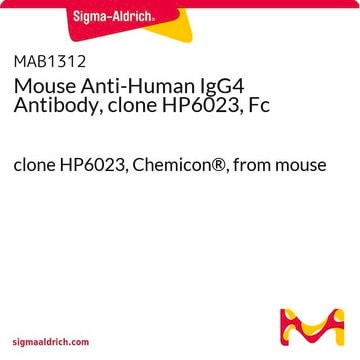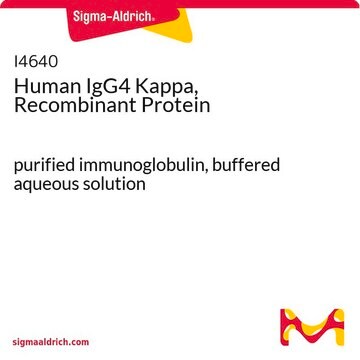I9888
Monoclonal Anti-Human IgG4 (pFc′ specific) antibody produced in mouse
clone HP-6023, ascites fluid
Sign Into View Organizational & Contract Pricing
All Photos(1)
About This Item
Recommended Products
biological source
mouse
conjugate
unconjugated
antibody form
ascites fluid
antibody product type
secondary antibodies
clone
HP-6023, monoclonal
contains
15 mM sodium azide
technique(s)
indirect ELISA: 1:2,000
isotype
IgG3
shipped in
dry ice
storage temp.
−20°C
target post-translational modification
unmodified
General description
An immunoglobulin has two heavy chains and two light chains connected by disulfide bond. It mainly helps in immune defense. It is a glycoprotein and is a major class of immunoglobulin. Immunoglobulin G (IgG) participates in hypersensitivity type II and type III. IgG is further subdivided into four classes namely, IgG1, IgG2, IgG3, and IgG4. Human IgG4 is rarely found in the serum. It has the ability to bind FcγRI with high affinity. High levels of IgG4 in the serum can be pathogenic and may lead to Wegener′s granulomatosis.
Human IgGs are glycoprotein antibodies that contain two equivalent light chains and a pair of identical heavy chains. IgGs have four distinct isoforms, ranging from IgG1 to IgG4. These antibodies regulate immunological responses to allergy and pathogenic infections. IgGs have also been implicated in complement fixation and autoimmune disorders . Monoclonal Anti-Human IgG4 (pFc′ specific) antibody is specific for an epitope on the pFc′ region of IgG4. The product does not react with IgG1, IgG2 and IgG3. This monoclonal antibody has been cited as the most widely applicable IgG4 specific reagent by the IUIS/WHO study.
IgG4 (Immunoglobulin G4) is produced by T helper 2 cytokines.
Immunogen
Purified human IgG myeloma proteins covalently coupled to polyaminostyrene (PAS) microbeads
Application
Monoclonal Anti-Human IgG4 (pFc′ specific) antibody has been used in immunoblotting.
Monoclonal Anti-Human IgG4 (pFc′ specific) antibody can be used for immunoblotting and Indirect Immunoperoxidase Assay.
This clone has been singled out as most widely applicable by the IUIS/WHO study.
Biochem/physiol Actions
IgG4 (Immunoglobulin G4) antibody has reduced affinity for C1q (first component of complement q) and hence its anti-inflammatory activity differs from that of the other IgG subclasses. IgG4 antibodies are known to actively interchange Fab arms with another molecule, resulting in recombined antibodies with two different binding specificities. This exchange is considered as an important biological mechanism that contributes to its anti-inflammatory activity. IgG4 antibodies are normally noninflammatory, but autoreactive IgG4 antibodies are known to be associated with Immunoglobulin G4 (IgG4)-related disease (IgG4-RD), characterized by infiltrating lymphoplasmacytic cells and elevated serum IgG4.
Disclaimer
Unless otherwise stated in our catalog or other company documentation accompanying the product(s), our products are intended for research use only and are not to be used for any other purpose, which includes but is not limited to, unauthorized commercial uses, in vitro diagnostic uses, ex vivo or in vivo therapeutic uses or any type of consumption or application to humans or animals.
Not finding the right product?
Try our Product Selector Tool.
Storage Class Code
10 - Combustible liquids
WGK
nwg
Flash Point(F)
Not applicable
Flash Point(C)
Not applicable
Certificates of Analysis (COA)
Search for Certificates of Analysis (COA) by entering the products Lot/Batch Number. Lot and Batch Numbers can be found on a product’s label following the words ‘Lot’ or ‘Batch’.
Already Own This Product?
Find documentation for the products that you have recently purchased in the Document Library.
Customers Also Viewed
D Bencina et al.
European journal of clinical microbiology & infectious diseases : official publication of the European Society of Clinical Microbiology, 19(7), 521-530 (2000-09-01)
Mycoplasma pneumoniae commonly causes respiratory tract infections in humans, but it may also be associated with central nervous system manifestations. The aim of the present study was to determine whether the cerebrospinal fluid taken from patients with neurologic symptoms due
Markus Wahrmann et al.
Nephrology, dialysis, transplantation : official publication of the European Dialysis and Transplant Association - European Renal Association, 27(5), 2122-2129 (2011-11-17)
Recipient desensitization using blood group (BG)-specific immunoadsorption (ABO-IA) has proven to enable successful kidney transplantation across major ABO barriers. In this context, the efficiency of non-antigen-specific (semiselective) IA adsorbers has not yet been established. The objective of our study was
Negative Immunodiffusion Test Results Obtained with Sera of Paracoccidioidomycosis Patients May Be Related to Low-Avidity Immunoglobulin G2 Antibodies Directed against Carbohydrate Epitopes
Neves, A., R., et al.
Clinical and Vaccine Immunology : CVI, 10(5), 802-807 (2003)
Negative immunodiffusion test results obtained with sera of paracoccidioidomycosis patients may be related to low-avidity immunoglobulin G2 antibodies directed against carbohydrate epitopes
Neves AR, et al.
Clinical and Diagnostic Laboratory Immunology, 10(5), 802-807 (2003)
What is IgG4 ? A review of the biology of a unique immunoglobulin subtype.
Nirula A, et al.
Current Opinion in Rheumatology, 23(1), 119-124 (2011)
Our team of scientists has experience in all areas of research including Life Science, Material Science, Chemical Synthesis, Chromatography, Analytical and many others.
Contact Technical Service









